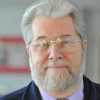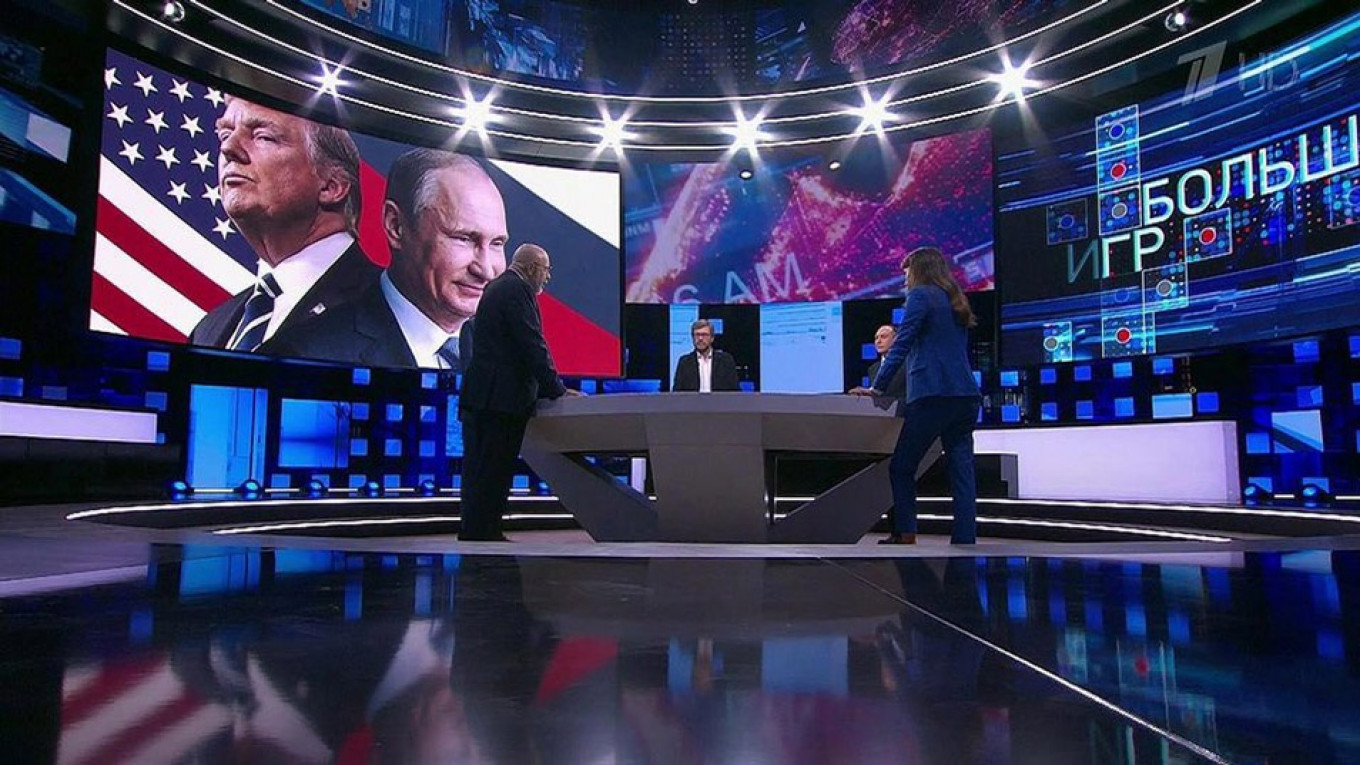Russian television political talk shows start with two strikes against them. First, they are aired at the sufferance of the current regime, which has no discernible interest in authentic political life or anyone talking about it on television. And second, the “experts” rolled out to do the talking are, with a very few exceptions, so utterly predictable as to make watching the shows unnecessary.
When something unexpected actually does occur — a Polish journalist dubs Russians “red fascists,” say, or Foreign Ministry spokesperson Maria Zakharova recounts how “the Jews” bought America’s presidential election – it becomes news you can watch in social media clips almost immediately after the fact without suffering through the whole program.
But on Monday, state television Channel One aired “The Great Game,” a new-format, adversary-inclusive entry into this unpromising arena. It features two principals, one of whom is an actual American expert, political scientist Dmitry Simes; the other is vociferous State Duma stalwart Vyacheslav Nikonov, grandson of Stalin henchman Vyacheslav Molotov.
The first show was a mixed bag.
On the one hand, the “Game” didn't live down to its own promo clip — there was no rhetoric about marionette controllers and no plumping of conspiracy theories about Who's Really Behind It All — and that was surely a good thing.
There were other encouraging signs as well. Simes did seem to have free rein to say what he wanted (some of which may well have singed some ears in the control room). The famously cynical Nikonov made various bogus charges, predictably, but at least did so while acting civil. And the invited experts — Paul Saunders, executive director of the Center for the National Interest, and Fyodor Lukyanov, chairman of the Presidium of the Council for Foreign and Defense Policy here — both made some reasonable points, reasonably.
Reactions to the life, death and legacy of U.S. Senator John McCain and his role in U.S.-Russian relations made a logical enough opening theme for the show.
Nikonov went into standard hyperbolic mode — “Relations between the two countries have never been so bad”; “If Russophobia is a disease, then McCain had an acute case of it” — yet the home team, in the figure of Lukyanov, intervened with the comment that “labels like Russophobia are not helpful” – which was itself helpful.
In the end, on the larger canvas of Russian political talk shows this one’s first episode could be called a semi-bright spot. Indeed, given the way Channel One marketed the thing, some viewers might have been disappointed by the definite lack of cold-warriory and conspiratorial stuff.
The bad news is that not being awful did not make it good or particularly memorable. It's like the old Zhiguli ad: "Better than you remember" — which in the end didn't sell a lot of cars.
For example, there was a great deal of talk, some of it sensible and some of it not, about American domestic politics as a driver of foreign policy — and practically zero analogous talk about Russian domestic politics as a driver of Russian foreign policy… presumably because nobody, Russian, American or Zimbabwean, is allowed to talk critically on television about Russia's lot on the home front, to which the phrase “slow-motion train wreck” might be applied.
All the point-scoring and erudite, Valdai-vetted, back-and-forth around and about the theme of a Great Game between these two nations on which the fate of humanity supposedly depends is kind of entertaining – and certainly far less mind-numbing than the show’s competition. But when the home-team regime’s shortcomings toward its own citizenry are apparently off limits for discussion, you start losing interest in the Great Gamesmanship pretty soon and start asking: What’s the point of all this again?
Here’s hoping that that becomes clearer and the “Game” reaches more of its potential as its premiere run continues through Thursday night. Should you tune in? Well, Nikonov is certainly right about one thing: “You won’t see this show on CNN!”
Mark H. Teeter is the editor of Moscow TV Tonite on Facebook.
A Message from The Moscow Times:
Dear readers,
We are facing unprecedented challenges. Russia's Prosecutor General's Office has designated The Moscow Times as an "undesirable" organization, criminalizing our work and putting our staff at risk of prosecution. This follows our earlier unjust labeling as a "foreign agent."
These actions are direct attempts to silence independent journalism in Russia. The authorities claim our work "discredits the decisions of the Russian leadership." We see things differently: we strive to provide accurate, unbiased reporting on Russia.
We, the journalists of The Moscow Times, refuse to be silenced. But to continue our work, we need your help.
Your support, no matter how small, makes a world of difference. If you can, please support us monthly starting from just $2. It's quick to set up, and every contribution makes a significant impact.
By supporting The Moscow Times, you're defending open, independent journalism in the face of repression. Thank you for standing with us.
Remind me later.







